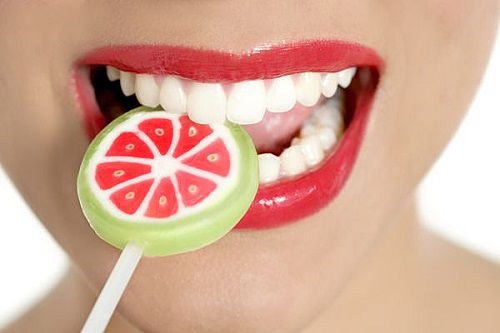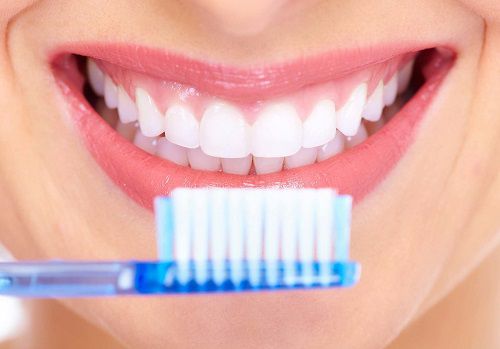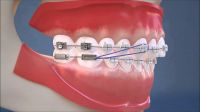Table of contents:
Basic rules of oral care for patients with diabetes.
Basic nutritional guidelines for maintaining healthy teeth in diabetes.
How to care for your teeth with diabetes. Dental care products.
Basic rules of oral care for patients with diabetes mellitus:
Visit your dentist every 3-6 months.
Carry out regular professional oral hygiene.
After each professional hygiene, change the toothbrush and, if necessary, carry out anti-inflammatory therapy prescribed by the doctor (for example, use toothpastes and rinses with antiseptic components for 2 weeks).
Treat gums and teeth on time.
Carefully care for your teeth at home.
Basic nutritional guidelines for maintaining healthy teeth in diabetes:
Eat foods that are good for your teeth:

- nuts (not to be confused with nuts for beer) - almonds, walnuts and hazelnuts;
- apples;
- carrot;
- sesame;
- greens (fresh parsley and dill);
- fresh vegetables - tomatoes, bell peppers;
- hard cheeses.
To avoid foods that are harmful to your teeth:
- lollipops and gummies;
- bananas;
- rich pastries;
- lemons and lemon water;
- Coca-Cola and all carbonated drinks;
- juices;
- nuts for beer;
- chicken cartilage, bones.

More details can be found here "Basic nutritional rules for maintaining healthy teeth"
How to care for your teeth with diabetes. Dental care products.
Since the mucous membrane of patients is very delicate, they also need gentle means:
The toothbrush is soft so as not to physically injure the mucous membranes and enamel of the teeth. With diabetes, wound healing is often difficult, therefore, in order to avoid injury to the gums, the bristles should be soft, thick, without additional silicone or rubber inserts. For example, we recommend the Curaprox 5460, Vitis toothbrushes.
Non-irritating toothpaste, preferably without lauryl sulfate, without abrasives and without peroxides (non-whitening). Such pastes are often made for children. For example, we recommend Curaprox Zero, Weleda toothpastes
Rinse aid - so that it does not have a strong taste, does not contain alcohol.
It is important that the paste and mouthwash for daily use do not contain chemical antibacterial components (thymol, triclosan, chlorhexidine). Since the risk of destruction of not only harmful, but also beneficial microbes is likely, which can lead to a violation of the microflora of the oral cavity, which will aggravate problems with mucous membranes.
Try to rinse your mouth with clean water after every meal.
If the patient uses removable dentures or removable orthodontic plates, then they must be removed after each meal and rinsed, and rinsed out the mouth. Every day before going to bed, brush them and clean them with special tablets to remove food debris and disinfect. You can read about the care of removable orthodontic plates here
If the denture or the plate is rubbed or causes discomfort, then it is necessary to consult a dentist unscheduled for correction, in order to avoid injury to the mucous membrane and the appearance of ulcers.
If there is a need to use antimicrobial and anti-inflammatory pastes, for example, with chlorhexidine or thymol, then they should be used no longer than two weeks.
The use of dental floss, brushes and an irrigator is highly recommended!
And smoking cessation is definitely recommended.
If there is a feeling of dryness in the mouth, it is recommended to use special products: toothpastes, rinses, gels, moisturizers, such as brands such as Dentaid Xerox, Xerostom, XeroLacer and others.
Read the same:
Dental treatment for diabetes
Changes in the oral cavity in diabetes mellitus.
The main symptoms of dental and dental problems in patients with diabetes mellitus.
Basic rules of oral care for patients with diabetes.
How to care for your teeth with diabetes.
Basic rules of dental treatment for diabetes.
Implantation, prosthetics and orthodontic treatment for diabetes mellitus
Is it possible to carry out implantation, prosthetics and orthodontics for diabetes mellitus?
Features of prosthetics in diabetes mellitus
Features of implantation in diabetes mellitus
Orthodontic treatment for diabetes mellitus.
Contraindications to implantation in diabetes mellitus
How to prepare for implantation, prosthetics and orthodontics for diabetes mellitus?
How does implantation work in diabetes?
Implant guarantee for diabetes mellitus.



